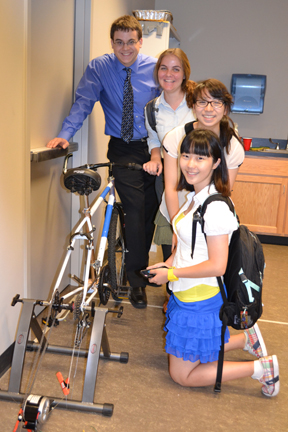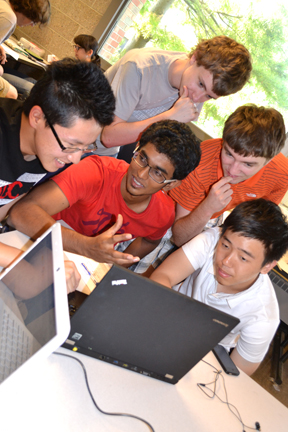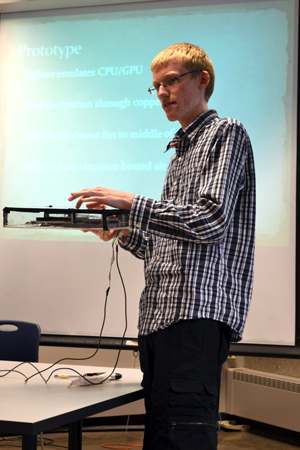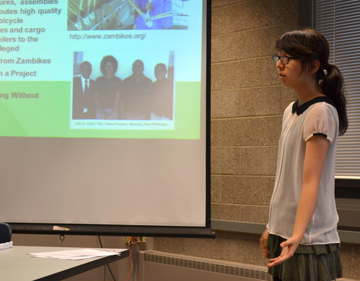Engineering's Summer Scholars Creates Small-Campus Feel for Freshmen
August 6, 2012

Power House team poses by the prototype of their power-generating stationary bicycle.
"Imagine coming to campus as a part of a group of twenty-two, and you have six RPAs and essentially have the resources of this university for 40,000 people, and you're here in the summer when it's nice and quiet and small." – Bruce Litchfield
Create a small-campus feel. This was the goal of Assistant Dean/Director Bruce Litchfield and IEFX Program Coordinator Michelle Adeoye for the College of Engineering's Summer Scholars Program. In this pilot program, a part of IEFX (Illinois Engineering First-Year Experience), 22 freshman engineering students admitted for the fall came to campus two months early to take classes during the summer. This enabled them to find their way around campus and get connected—all before the big rush in the fall when the other engineering students arrive.
The main thrust of Summer Scholars is to provide participants a concentrated, focused set of supports and resources. Part of a cohort of peers, students can immediately network and build relationships with other freshman engineering students for study groups and support. To foster this community, the 2012 participants all roomed in the same dorm and took one class together.

The C3 team working on an Android phone ap Illinois students could use to navigate campus and download info about campus buildings.
According to Litchfield, the program was designed to foster community: "We talk about the joy of engineering, the joy of learning, and the joy of community. And it's that third one [where] we often come up short; getting them involved in relationships and community. We know that's a key to their success, and we try to communicate that, but this program really forces it. It helps facilitate it so it really happens."
The program also has its own built-in mentoring component: Resident Project Advisors (RPAs). Not only were this summer's RPAs resident advisors (RAs) in the dorm where students stayed, they were teaching assistants (TAs) in the class they took together.
One RPA, Anderson West, a senior in physics, called his role "a combination gig, because I am both connected to them academically as well as we are living in the same dorm and looking after them there."
West reported encountering some typical, first-time-away-from-home issues that could be chalked up to immaturity. For example, he confided, "I know a couple of them just did their laundry for the first time," (Note: This interview took place near the END of the summer semester.) Regarding dealing with roommates, he recommended that students who found both living and working with the same people to be a challenge just needed to learn to communicate:

John Quarnstrom displays the Laptop team's project–a contraption that warms one's fingers while working on a laptop.
"The majority of the people you come across are reasonable people. You just have to be able to connect with them in the proper ways. And so what we are teaching is both leadership and being able to work with a team when you're doing the engineering project, but also being able to live residentially and work with people residentially to survive."
For these freshmen, it was a growing experience: "I know the first couple weeks, they weren't getting things done in study groups," reports West. "But now, I walk into the lounge, and they're actually doing things. Because when the rubber hits the road, you have to end up actually doing things before tests start kicking in. These are all things they've had to address, and I think most of them have been pretty successful."
West agreed that an important component of this program was community—"having an environment where you can come into a lab like we're in right now and work and do things and having people you can talk to." He also indicates that, as a mentor, he was able to share from his own life experiences and hopefully make a difference in the lives of some of these young students: "I've talked to some people that have had bad test grades already. They got caught off guard…We've all been freshmen…I've given a couple stories where I've failed. Everyone has to fail in order to actually learn. Hopefully they won't fail as hard or fail in different areas. Everyone makes mistakes, but how you learn from them, that's another big part of it."
Another RPA, Maria Jones, tried to give students the support she wishes she had received as an international coming onto campus for the first time: "I personally think this is an amazing opportunity. I wish I had something like this in my freshman year. It really helps in the transition."

Mariko Wakabayash discusses the Power House team's power-generating bicycle during their final presentation.
As a grad student familiar with navigating the campus, Jones was able to help students in numerous ways: "I've basically been helping them a lot with their projects classes, because I already have a lot of resources, being a grad student who's finished two years of a Master's here. So I've been able to help students with making meetings, meeting other professors, finding other resources...In terms of individually interacting with these students, I've been able to do that…not as huge groups, but person to person, I have been able to take out time and spend time with certain individual students."
An international student herself, Jones also had a good rapport with the students from other countries: "I also feel I also have a good connection with other international students who are here, because I can understand where they're coming from and what they're going through. So I help them with resources, or motivate them."
In addition to students living in the same dorm and taking a class together, another program component was leadership. Students participated in two of the Illinois Leadership Center's iPrograms, one-day workshops involving leadership-building, small group activities: Insight, which addressed knowing yourself better and knowing how you work as a leader; and Intersect, which addressed working together with other people in a team. As an added bonus, RPAs facilitated the small-groups, so scholars got to know their RPAs better as well.
Another program component involved seminars on Tuesdays and Thursdays. Tuesday seminars were provided by faculty or staff about things that would help the students academically. For example, Professor Ray Price presented on how to be a successful student. The Technology Entrepreneur Center did a seminar on entrepreneurship and starting a business. Litchfield reported that the program wanted to encourage students to be entrepreneurial right from the start: "One of the norms here is being entrepreneurial; if you have an idea, we want to nurture it, and not just say, 'Oh, wait until you get your degree, then work on it.'" A representative from the university's Career Center also did a seminar on careers.
On Thursdays, students attended industry seminars. Michelle Adeoye, iEFX Program Coordinator, shared that they also hope to encourage students to think about and prepare for their future careers: "Another thing we want to instill here is that students can start thinking about internships and jobs, or non-learning—that they're looking at freshmen." For example, someone from John Deere spoke about what type of engineers they hire and what things they're looking for in students when they hire them for internships. In addition, students toured campus and industry facilities, such as Caterpillar and Blue Waters, the new campus super-computer facility.
Story continues on page 2: Design Course Projects













.jpg)
















